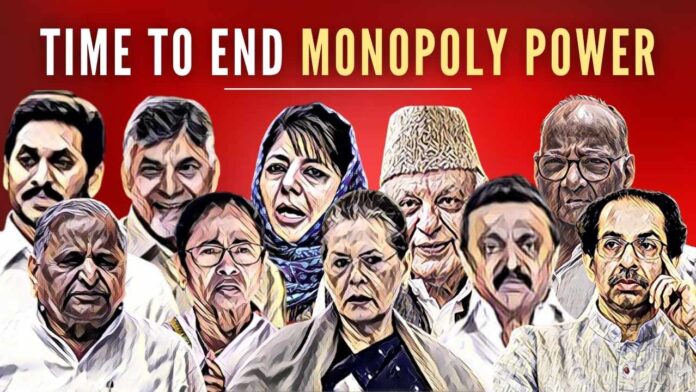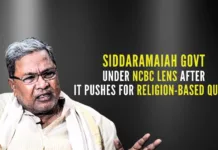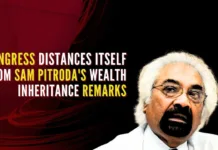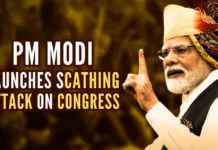
Lesson from Sri Lanka: Don’t be trapped into dynastic culture
Sri Lankan political disaster teaches us many lessons. One of the important lessons is the danger of the control of political power by any one person or a family, for long.
We have been discussing the problem of dynastic politics on public platforms, but we have not been discussing the hold of any person or family on a political party for long periods of time, say beyond 10 to 15 years.
Almost every major political party in India, at the Centre and the states, is the private proprietary property of a single family. There are leaders outside such families who hold important positions, but the ultimate control of each such party is in the hands of just one family. Examples are Congress, DMK, SP, BSP, TRS, YSRCP, TDP, NCP, Shiv Sena, TMC, NC, PDP, JDS, etc.
Since political power is invariably misused by almost all political parties to amass wealth, accounted and unaccounted, in their own names, the names of their family members, and their benamis, in India and abroad, we are creating monopolists who will dominate Indian politics almost forever and ever.
Since this is a high investment, high stakes business, the current system breeds higher and higher levels of corruption, and investment of the corrupt money back into politics, growing the political parties into Frankensteins.
This is much more dangerous (for the country and the states) than monopoly power in business and industry. We have at least some checks and balances to prevent monopoly in business and industry but none in politics.
Any one person or family of persons who have the highest level of power in the party will not allow anyone else outside the family to compete. By allowing monopoly in politics, we are not only pledging our lives and our future but also the lives and future of all our future generations. The longer this goes on, the more difficult it will be to break this chain.
Power corrupts, absolute power corrupts absolutely, and longstanding power corrupts interminably. Since the stakes are high and long-term, the problem only gets into monstrous proportions.
A fair principle to lay down, in my opinion, could be that no individual can hold any one position, say the position of PM, CM, or party head, for more than 10 years, and any combination of these positions for more than 15 years, in one or more stretches.
And when they hold any of these positions, none of their close relatives (parents, spouse, children, siblings, or any other relatives we may want to include in this list) can hold any of the other positions.
And there should be a clear break of at least 10 years before such relatives can hold any of these posts after the former person demits/ loses office, or dies while in office.
Some such restrictions (not exactly the same) are in force in some advanced countries. For example, the US President can have a maximum of 2 tenures of 4 years each.
This reform will significantly break the hold of any person/ family on her/ his party, and there will be a better chance for the inner party democracy. Hero worship will come down. In politics, it is very difficult to wrest back power after a 10-year hiatus, unless the person has really strong popular support.
If the Central government acts now when the iron is hot and people are able to see the dangers of a concentration of powers in one family, pushing through this reform may gain nationwide popular acceptance. Since BJP will not be a party that will be affected by this, at least immediately, it should have no difficulty bringing in such legislation.
To start with, the Central government and the BJP-ruled states can bring in legislation to this effect. Sure enough, there will be stiff resistance from all the affected parties. People have been voting for the dynastic and monopolistic political parties repeatedly for decades not because they like them, but because they have no credible options.
This move will force the hands of the other political parties and they may be forced to reform, some new political parties may be born because of the opportunity this move will create, or people might vote dynastic and monopolistic parties out of power. All of which are for good.
This may not solve all the problems of Indian politics, but it will minimize the ills our politics suffers from substantially.
There are very few exceptions, of course, where the monopoly of a person has not been detrimental to the nation or the states. Naveen Patnaik has been the leader of the BJD party and the CM of Odisha for 22 years, and he has been giving excellent leadership, to the party and the state. Modi has been PM for 8 years, after a stint at Gujarat as the CM for 13 years.
Since any new legislation can only be prospective and not retrospective, this may not affect them immediately.
This legislation will bring about a very major change in Indian politics.
Note:
1. Text in Blue points to additional data on the topic.
2. The views expressed here are those of the author and do not necessarily represent or reflect the views of PGurus.
PGurus is now on Telegram. Click here to join our channel and stay updated with all the latest news and views
For all the latest updates, download PGurus App.
- How BJP can get 33%+ vote share in TN - April 1, 2024
- A transparent, equitable electoral funding alternative - March 19, 2024
- How TN BJP can come to No. 1 or No. 2 in 2024 LS polls - January 11, 2024











Although this is an interesting proposal, banning relatives of the political parties is unconstitutional and will never get a clean chit from the courts. The best alternative is to educate the people and ‘sort of brain wash’ them not vote relatives of the sitting politicians. But when people drool ONLY for freebees any strategy against this nepotism is an an incredibly uphill task but not impossible?